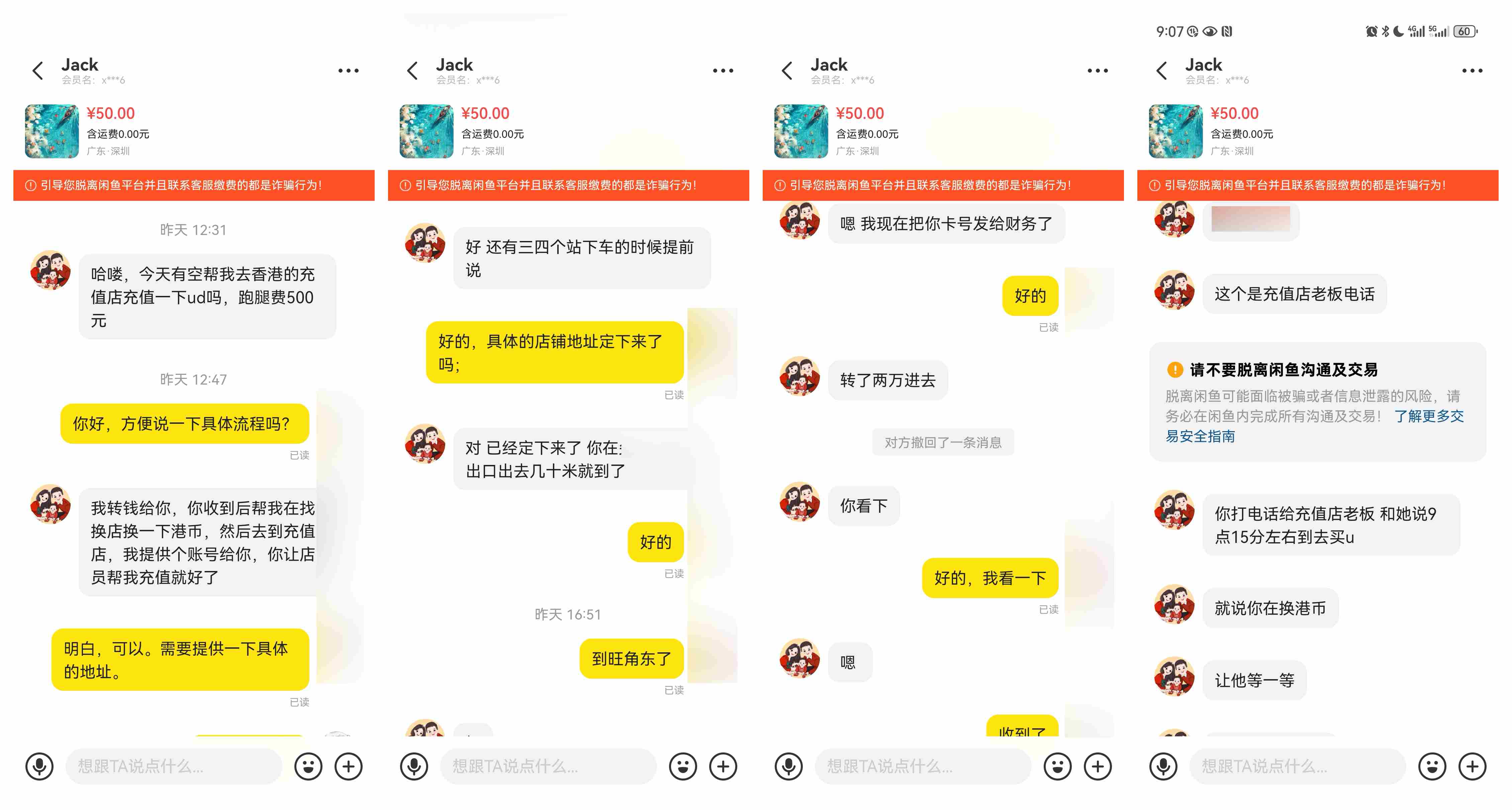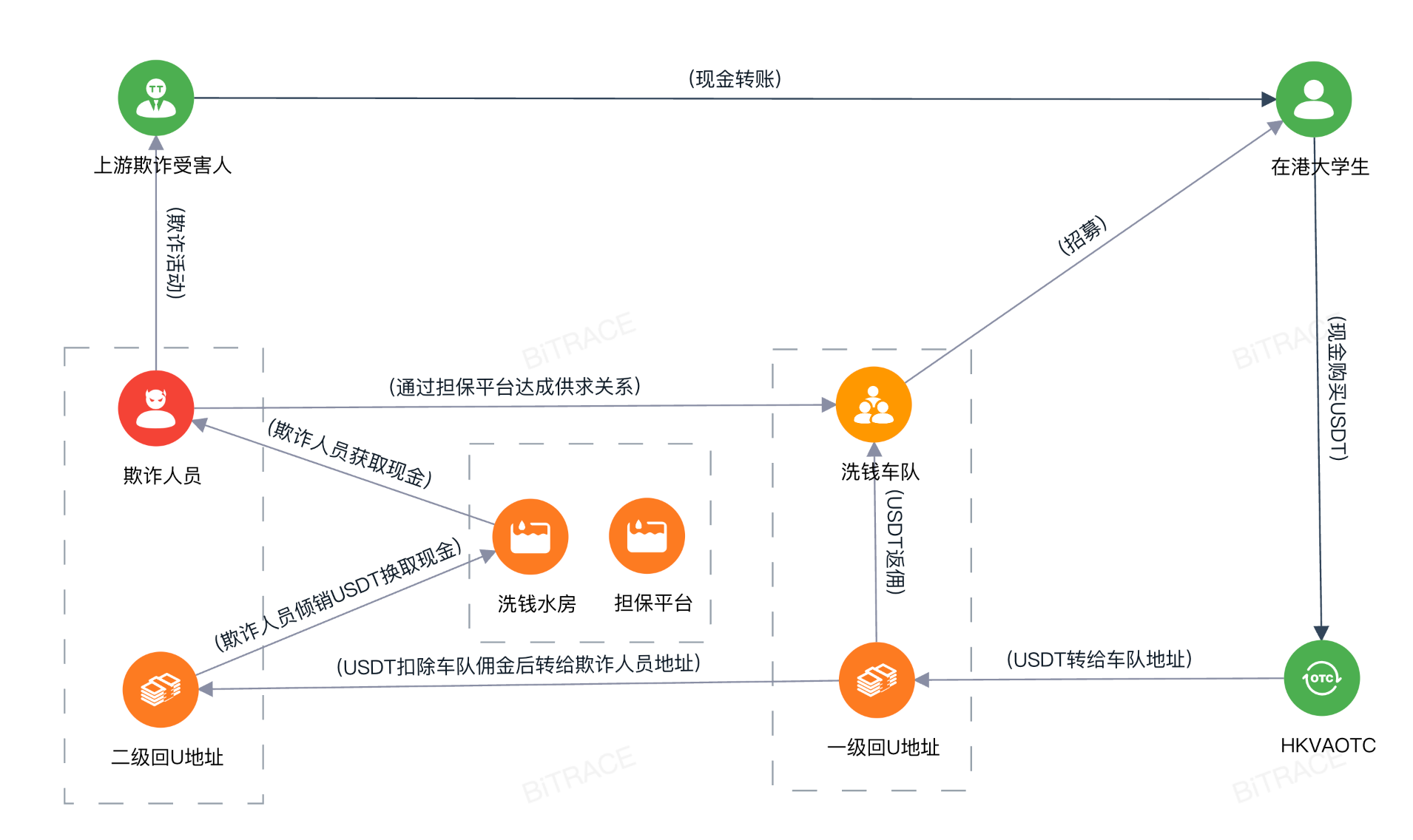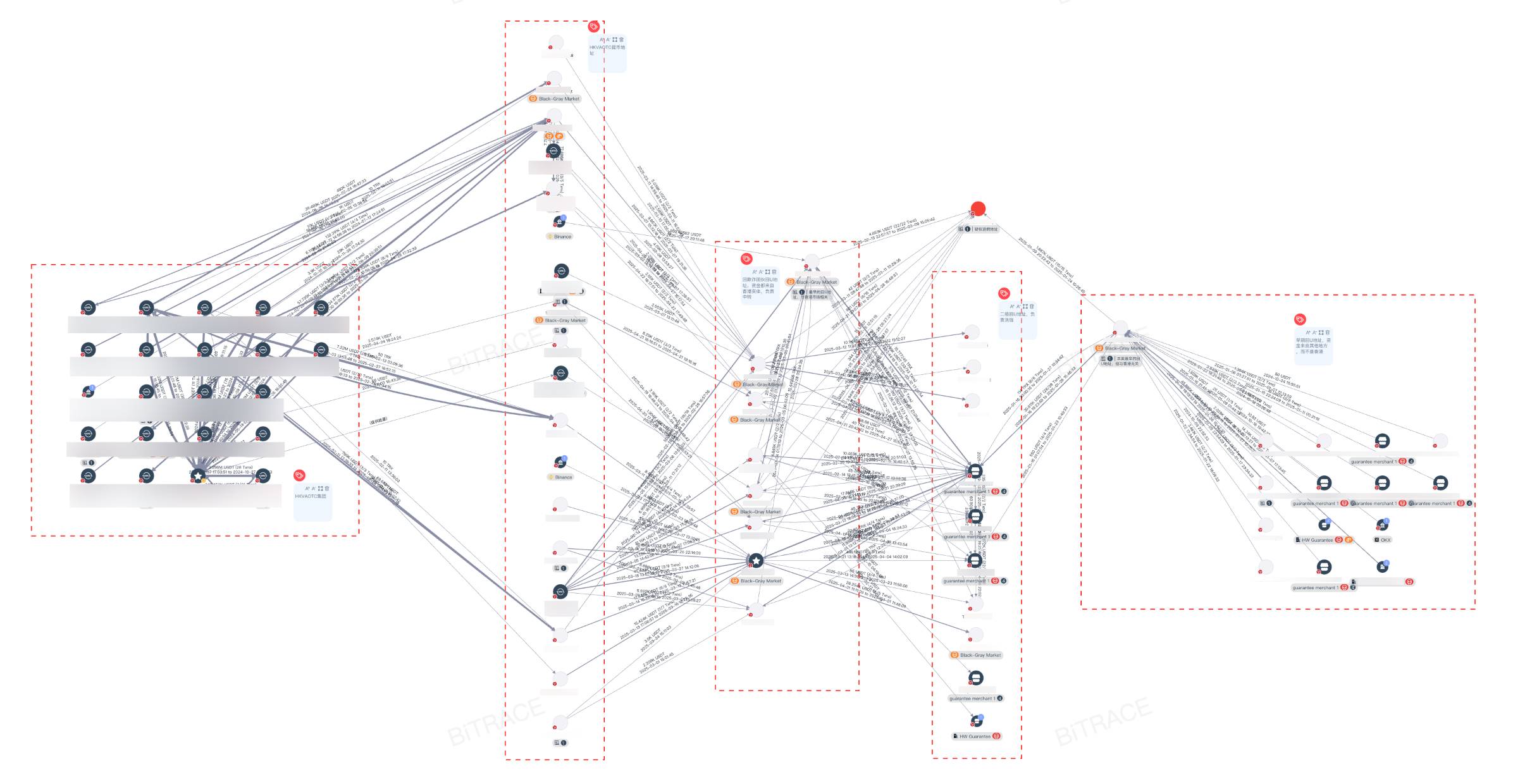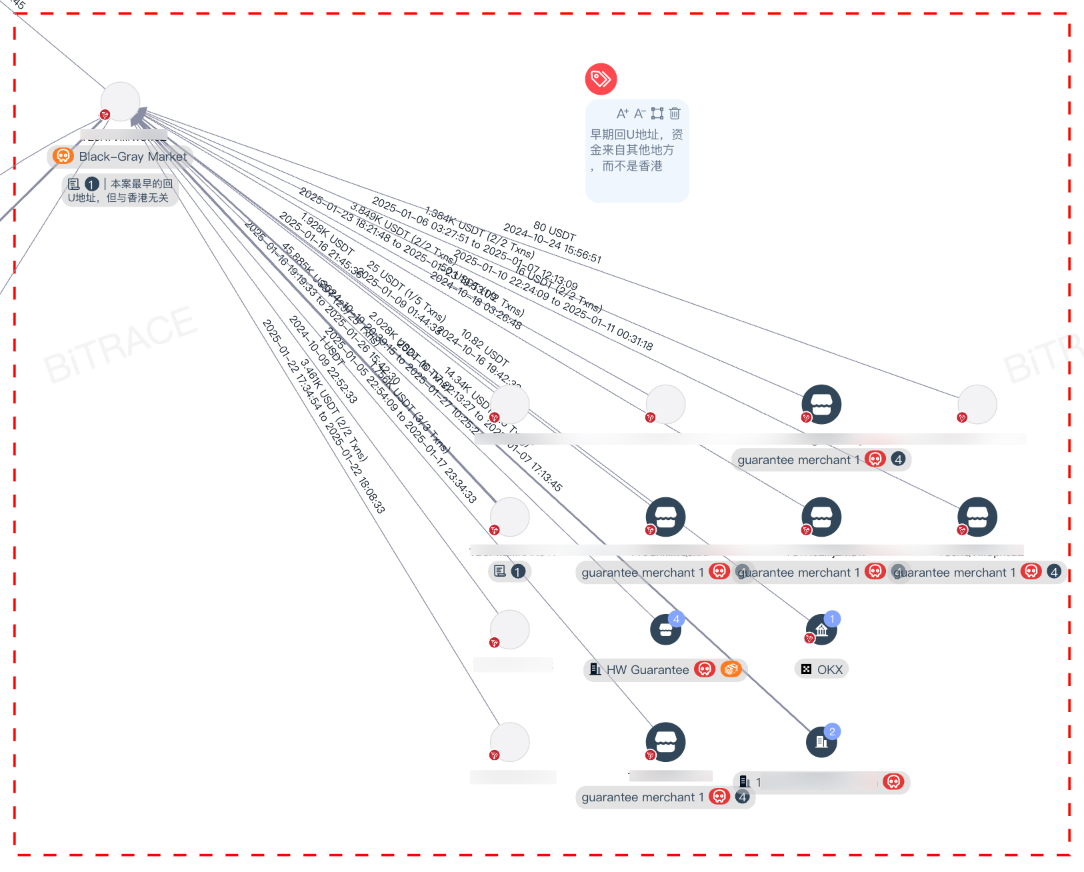In less than three months, a single money laundering syndicate has illegally laundered over 310,000 USD in Hong Kong using the same method.
Author: Bitrace & Mankun
As a world-renowned free port and international financial center, Hong Kong has seen a thriving crypto-economic ecosystem emerge years before the introduction of official preferential policies. Among these, virtual asset over-the-counter trading service providers (VAOTC), which operate through offline stores and online groups, are particularly distinctive. Together with local and overseas virtual asset trading service providers (VATP), they provide token exchange and fund deposit/withdrawal services for virtual asset investors in Hong Kong.
However, due to the high anonymity and borderless nature of virtual assets based on blockchain technology, various cryptocurrencies related to criminal activities—especially stablecoins—can flow into the Hong Kong crypto ecosystem without barriers, causing financial pollution to local operators and ordinary investors, bringing legal and compliance risks.
This article aims to analyze the recent money laundering incident involving mainland university students in Hong Kong, exploring the ways in which the Southeast Asian fraud industry damages Hong Kong's crypto economy and disclosing relevant data.
Incident Description
On March 26, 2025, a mainland university student received a part-time job on a second-hand goods trading platform, where they were asked to go to Hong Kong to purchase a certain amount of Tether (USDT) through a local exchange shop and transfer it to a designated blockchain address. The process involved using a personal bank card to receive RMB, exchanging it for Hong Kong dollars at a local fiat currency exchange, then going to a designated cryptocurrency exchange shop to buy USDT and having the shop directly transfer it to the designated wallet.

After purchasing USDT worth tens of thousands of RMB in this manner, their bank card and WeChat Pay were frozen by mainland law enforcement, and they were informed that the funds received were transferred from victims of upstream fraud incidents.
Subsequent investigations by Bitrace and Mankun Law Firm revealed that this was a typical "card-to-U" money laundering method, closely related to organized crime networks in Southeast Asia.
On-chain Analysis
Analyzing the designated receiving address TTb8Fk revealed that the student purchased 2,396 USDT from the designated exchange shop. This fund subsequently flowed into the merchant address TKN5Vg, which has long-standing business ties with Huione Guarantee and Newcoin Guarantee, two Southeast Asian entities.

These two guarantee platforms have long provided services to organized crime industries in Southeast Asia, including illegal online gambling, gray and black markets, money laundering, and fraud. In this incident, they played a role in processing upstream fraudulent funds.
This indicates that this is a malicious event where a Southeast Asian fraud group utilized Hong Kong's cryptocurrency exchange shops for money laundering.

The method is a common "card-to-U (Crypto-based money laundering)" technique, meaning that money launderers collect fiat currency from fraud victims, quickly exchange it for USDT in the over-the-counter market, then transfer it back to the blockchain address of the fraudsters, earning a commission in the process. Since purchasing USDT requires a significant amount of bank card and real-name information, money launderers recruit a large number of part-time workers to form a "money laundering syndicate (Crypto Laundering Syndicate)," with these part-time workers referred to as "card farmers" or "runners."
In this incident, the mainland student unknowingly became a money laundering runner, assisting money launderers in converting funds along with Hong Kong VAOTC. The USDT obtained first entered the syndicate's address, and after deducting the commission (calculated at a rebate rate of 33%), the funds were transferred to the guarantee merchant, ultimately settling through the guarantee platform.
Criminal Industrialization
Bitrace further expanded the analysis of the rebate address TGeZzC, discovering that this money laundering incident is not an isolated case but rather the tip of a highly industrialized large-scale money laundering gang.

Tracing the source of funds for the rebate address reveals seven other primary "return-to-U" addresses (left three), which are at the same level as TTb8Fk and have received varying amounts of USDT from Hong Kong exchange shops (left one and two, HKVAOTC). Of these, 33% was transferred to the rebate address (marked in red), and 67% went to secondary return-to-U addresses (right two), which were then dumped through the guarantee platform, showcasing a very clear division of labor throughout the process.

Analysis shows that these addresses have been active since 2024, with the initial source of funds unrelated to Hong Kong, but rather linked to numerous high-risk addresses in Southeast Asia's gray and black markets. This further indicates that the case is connected to a gang closely related to organized crime networks in Southeast Asia.
In less than three months, this single money laundering syndicate has illegally laundered over 310,000 USD in Hong Kong using the same method. Considering that there are still other addresses in this case that have not been expanded or other gang addresses that have not been detected, the actual scale of such industrialized money laundering activities illegally utilizing HKVAOTC may be even larger.
The Dawn of Hong Kong's VAOTC Industry
Lawyer Shao Shiwei from Shanghai Mankun Law Firm stated that globally, the regulatory framework for OTC merchants in various countries and regions has not yet reached complete uniformity. However, major OTC operating locations such as Hong Kong, the European Union, and the United States have begun to draft relevant legislation and licensing management regulations.
Taking Hong Kong as an example, the Financial Services and the Treasury Bureau (FSTB) released a legislative consultation document regarding virtual asset over-the-counter (OTC) services in February 2024. The document proposed an important suggestion to introduce a licensing system for OTC merchants through the Anti-Money Laundering and Counter-Terrorist Financing Ordinance (AMLO). According to this proposal, Hong Kong plans to establish a licensing management system for OTC merchants through the AMLO, with the core purpose of ensuring that these companies can meet compliance requirements related to anti-money laundering (AML) and customer identity verification (KYC).
This means that all companies providing virtual asset over-the-counter trading services, including OTC merchants, must apply for the corresponding licenses from Hong Kong Customs (CCE) and strictly adhere to relevant legal regulations. However, as of now, this legislation is still in the consultation phase, and specific implementation details and effective dates await formal government announcement.
Industry Operators Must Actively Respond to Regulation
Currently, VAOTC has become an indispensable part of the cryptocurrency market, playing a crucial role in market stability and industry development. As Hong Kong is about to introduce OTC compliance policies, operators within the industry must adopt a more proactive attitude to meet regulatory requirements.
Operators in the industry not only need to strictly comply with the upcoming licensing system but also establish and improve internal compliance systems to ensure that all trading activities meet compliance requirements related to anti-money laundering (AML) and customer identity verification (KYC).
At the same time, operators should further strengthen communication and interaction with regulatory agencies, actively seek to understand the latest policy developments, and participate in industry self-regulatory organizations to contribute to the standardized development of the entire industry.
In this process, industry operators particularly need to emphasize the importance of refusing any association with illegal activities involving cryptocurrency funds. By implementing strict customer due diligence and transaction monitoring measures, they can identify and resist suspicious fund flows, avoiding providing any convenience for illegal activities.
This not only helps maintain the good reputation of the enterprise but also reflects the company's fulfillment of social responsibility.
Overall, the upcoming OTC compliance policies in Hong Kong represent an important opportunity for the virtual asset over-the-counter trading industry to achieve standardized development. Operators within the industry should seize this opportunity, proactively adapt to changes in the regulatory environment, continuously enhance their compliance levels, and thereby strengthen their competitiveness. Only in this way can they maintain an invincible position in the prosperous market of Hong Kong's crypto economy and achieve long-term stable development.
免责声明:本文章仅代表作者个人观点,不代表本平台的立场和观点。本文章仅供信息分享,不构成对任何人的任何投资建议。用户与作者之间的任何争议,与本平台无关。如网页中刊载的文章或图片涉及侵权,请提供相关的权利证明和身份证明发送邮件到support@aicoin.com,本平台相关工作人员将会进行核查。



